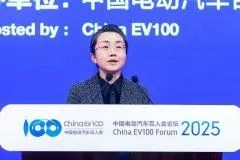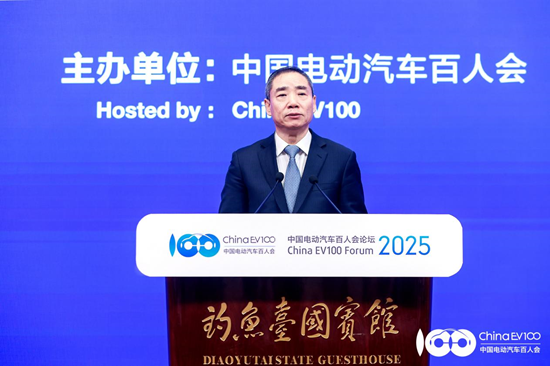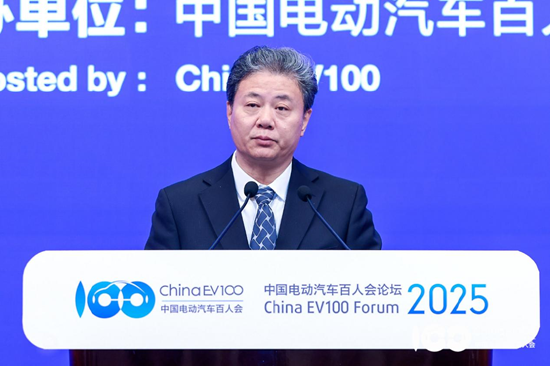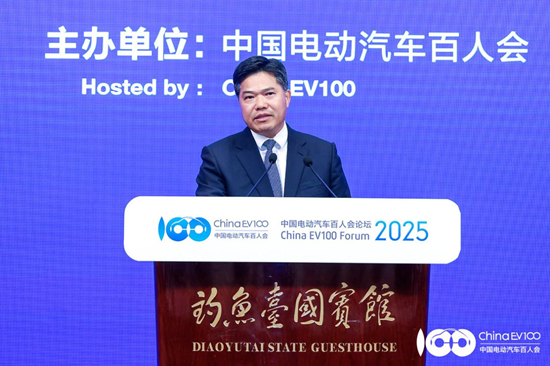Key Insights from Ministry and Commission Speeches at the 2025 EV100 Forum
![]() 03/31 2025
03/31 2025
![]() 547
547
At the 2025 EV100 Forum, several national ministries and commissions presented speeches and presentations, outlining their policies and industrial support for China's smart electric vehicles. This article leverages AI technology to refine and summarize the key messages from these speeches, shedding light on the core content, policy trends, and development directions for China's smart electric vehicle industry. While skepticism about AI's accuracy persists, our approach ensures the purity and authority of the data by summarizing the original speech content, akin to alchemy where the finest raw materials yield the purest essence.
Core Content and Insights from Various Ministries and Commissions:
1. National Development and Reform Commission

Core Speech Content:
- Industrial Structure Optimization: Promoting mergers and acquisitions, eliminating outdated capacity, and implementing qualification group management reforms.
- Market Rectification: Cracking down on price wars, false advertising, and regulating investment attraction and local protectionism.
- Technological Innovation: Supporting breakthroughs in solid-state batteries, high-level intelligent driving, and automotive chips.
- Open Cooperation: Deepening international R&D cooperation, supporting foreign enterprises' integration into the industrial chain, and facilitating enterprises' "going global" strategies.
Revealed Information:
- Accelerated Industrial Integration: Optimizing production capacity through market means and fostering leading enterprises.
- Technological Self-Reliance: Emphasizing foundational technological innovation to create a highly competitive industrial chain.
- International Layout: Promoting global cooperation while navigating trade protectionism challenges.
2. Ministry of Industry and Information Technology

Core Speech Content:
- Technological Breakthroughs and Scale Advantages: Mass production of fast charging, popularization of L2 assisted driving, and global leadership in export volume.
- Transformation Directions: Emphasizing both scale and efficiency, breakthroughs in foundational technology, multi-industry integration, and full lifecycle services.
- Specific Measures: Accelerating the industrialization of autonomous driving (L3 access pilot), trade-in promotions, and promoting digitalization across the entire industry chain.
Revealed Information:
- Acceleration of Intelligence: L3 autonomous driving entering a significant promotion phase.
- High-Quality Development: Encouraging enterprises to shift from "price competition" to "quality and service competition".
- Industry Chain Coordination: Strengthening integration with energy, transportation, information and communication, and other fields.
3. Ministry of Housing and Urban-Rural Development

Core Speech Content:
- Vehicle-City Coordination: Promoting the integration of intelligent connected vehicles and urban infrastructure (e.g., road-cloud integration pilot).
- Smart City Foundation: Building a digital governance platform to enhance monitoring, early warning, and emergency response capabilities.
- People's Livelihood Service Scenarios: Smart parking, charging and battery swapping facility upgrades, and promoting digital homes and smart residential areas.
Revealed Information:
- Scenario-Driven Development: Providing landing scenarios for smart vehicles through smart city pilots.
- Digital Infrastructure Needs: Improving the charging and battery swapping network as a key support for urbanization.
4. Ministry of Commerce

Core Speech Content:
- Stimulate Domestic Consumption: Directing trade-in subsidies towards the new energy sector and supporting county-level charging and battery replacement facilities.
- Promote Internationalization: Encouraging overseas factory construction and sales network layout to navigate tariff barriers.
- Introduce Foreign Investment: Attracting new energy vehicle foreign investment projects and optimizing the foreign investment environment.
Revealed Information:
- Continuation of Domestic Demand-Driven Policies: Increasing consumer subsidies and expanding the new energy vehicle market into counties.
- Globalization Challenges: Navigating international protectionism while emphasizing overseas expansion as a core strategy.
5. State-owned Assets Supervision and Administration Commission
Core Speech Content:
- Central Enterprise Innovation Leadership: Tackling key technologies like solid-state batteries, full-stack intelligent driving, and cross-border integrations like the low-altitude economy.
- Restructuring and Integration: Promoting the merger of central state-owned automobile enterprises to enhance concentration and global competitiveness.
- Management Model Reform: Promoting digital transformation (e.g., AI R&D), flexible authorization mechanisms, and encouraging central-local cooperation.
Revealed Information:
- Central Enterprises' Core Role: Leading national strategic technological breakthroughs and internationalization efforts.
- Non-Price Competition Orientation: Emphasizing quality, service, and user experience over internal competition.
6. National Energy Administration
Core Speech Content:
- Improvement of Charging and Battery Swapping Networks: Accelerating the application of fast charging technology and promoting pilot projects to address urban and rural shortcomings.
- Green Energy Security: Focusing on power battery recycling, utilization, and mineral resource security.
Revealed Information:
- Urgency of Energy Infrastructure: Addressing the inadequate charging and battery swapping facilities to support large-scale electrification.
- Circular Economy Layout: Accelerating the battery recycling system to reduce resource dependence risks.
Overall Strategic Signals for China's Smart Electric Vehicle Development:
- Core of High-Quality Development: Transitioning from extensive expansion to technology-driven, full industry chain coordination, and efficiency optimization.
- Key Areas of Technological Breakthroughs: Focusing on solid-state batteries, automotive chips, and intelligent driving systems.
- Dual Paths of Internationalization: Encouraging global layout while addressing rising trade barriers.
- Support from Scenarios and Infrastructure: Smart city pilots and charging/battery swapping network coverage providing a foundation for technology implementation.
- Leading Role of Central Enterprises: Concentrating resources to break through core technologies and drive industrial transformation and upgrading.
Reproduction and excerpts are strictly prohibited without permission.
PDF of Speeches by Various Ministries and Commissions at the 2025 EV100 Forum







